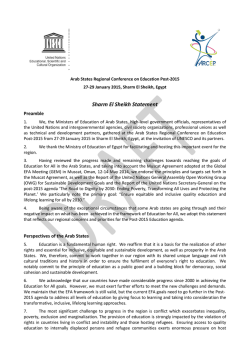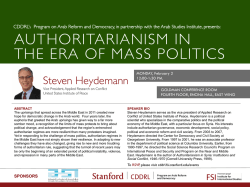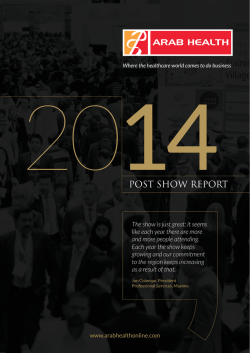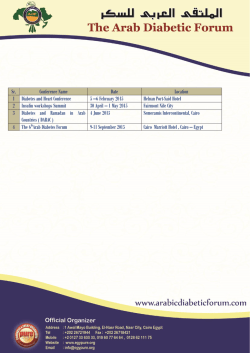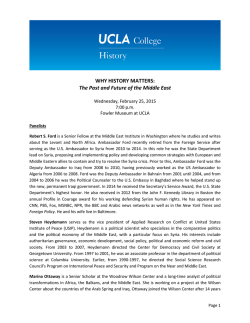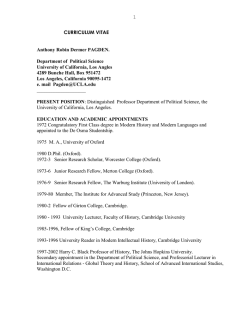
! Juego Europa Casino Descargar
S y m p o s i u m : I m p e r ia l Tra u ma , Pa r t 3 IMPERIAL TRAUMA: THE CASE OF THE ARABS Patricia Crone The symposium theme, “imperial trauma: the powerlessness of the powerful,” has a nice paradoxical ring to it. The obverse would be something like “obedient health: the powerfulness of the powerless,” which sounds equally enticing, but what precisely might it be? It is well known that empires are often weaker than they look in various respects, but that hardly amounts to cases of trauma. The leading essay in the first installment speaks of “practical and ideological traumas” in connection with the constraints and burdens that empires place on their bearers—the costs of empire, in short, but in a sense going far beyond economics.1 This is certainly a subject worth attention, but even here “trauma” seems too strong a word as long as the constraints and burdens are of the type required to keep the empire running. Besides, are they examples of powerlessness? I can only think of one situation in which the expressions “imperial trauma” and “imperial powerlessness” fit effortlessly together, and that is the one in which empire builders find themselves transformed by their acquisition of empire at such speed that they are conscious of losing their cherished ways, indeed their very selves, yet cannot stop or reverse the process. It is a situation familiar to the Central Asian conquerors of China. Time The author would like thank Michael Cook for commenting on a draft of this article. 1. Linda Colley, “Introduction: Some Difficulties of Empire—Past, Present, and Future,” Common Knowledge 11.2 (spring 2005): 199. Common Knowledge 12:1 Copyright 2006 by Duke University Press 107 10 8 COMMON KNOWLEDGE and time again, they tried to square the circle of how to lay their hands on the wealth and power of China without being transformed by Chinese culture, only to fi nd that the sole way to remain themselves was to stay “in the forests of Ötüken,” as a Turk advised in the famous Orkhon inscriptions (c. 700 AD).2 All creators of empires have to cope with the transforming effects of new wealth and power, but upstart societies conquering rich lands with ancient civilizations are more likely to lose their ancestral ways than most, and members of simple societies such as those adapted for life on the steppe are the most likely of all to do so. Whatever the nature of the two parties, though, it is a general rule that the few cannot conquer the many without becoming more like them and eventually merge with them, in some way or other, if the relationship continues for long enough (however “long enough” may be). The Romans provide another example, and the Arabs provide a third. Briefly to remind the reader of the Roman development, the many problems that the Romans faced as a result of their expansion included that of preventing the wealth and political opportunities in the conquered lands from undermining the social and political organization of the metropole, the Roman city-state. Ultimately, it proved impossible. The republic collapsed in civil war, to be replaced by the principate of Augustus (27 BC–14 AD). Already by then, however, it had long been clear that there was a cultural analogue to this problem, namely how to prevent the ways of the conquered peoples from undermining those of Rome. In the long run, that too proved impossible. According to Cato (d. 149 BC), Rome would lose her empire when she became infected with Greek letters: one can follow the progress of the infection in the patient’s complaints. “Through conquering we have been conquered. We are the subject of foreigners,” Pliny (d. 79 AD) said, with reference to the popularity of Greek doctors.3 Juvenal (d. c. 130) could not stand “a Greek city of Rome,” let alone that Greeks were only “part of the dregs” one encountered there: “The Syrian Orontes has long since flowed into the Tiber, bringing with it its language and its habits,” he said; prostitutes from all over the Mediterranean were “ready to worm their way in the houses of the great and become their masters”; meanwhile, dishonest easterners, experts in flattery, and furthermore promiscuous, were taking over the city with their money, so that “here in Rome the son of free-born parents has to give the wall to some rich man’s slave.”4 Horace (d. 8 BC) put a more positive spin on Hellenization: “Captive Greece took her savage victor captive and brought her arts to rustic 2. Patricia Crone, Slaves on Horses: The Evolution of the Islamic Polity (Cambridge: Cambridge University Press, 1980), 18, citing Vilhelm Ludvig Peter Thomsen, Inscriptions de l’Orkhon déchiffrées (Helsinki, Finland: Société de littérature Finnoise, 1896), 117. 3. Benjamin H. Isaac, The Invention of Racism in Classical Antiquity (Princeton, NJ: Princeton University Press, 2004), 225 (and n. 6), 228, citing Plutarch, Cato Maior, 23.3; Pliny, Natural History, 24.1.5. 4. Isaac, Racism, 231, citing Juvenal, Satires, 3.60–72, 131. 10 9 Imperial Trauma: Part 3 • Crone Latin,” as he said in his oft-quoted lines.5 But then, Horace was a mawlā, as the Arabs were to call it: a man of servile origin. Though Gauls and other westerners also contributed to the sense that Rome had become “a captured city,” it was primarily Greeks and easterners who were perceived as a threat to Roman ways, associated as they were with luxury, effeminacy, sexual depravity, and strange cults.6 “The vanquished have given laws to their victors,” Seneca (d. 65) complained, outraged that Jewish religious observances were now “received throughout all the world.”7 “Would that Judaea had never been subdued by Pompey’s wars and Titus’ military power,” a fifth-century pagan echoed with reference to the unstoppable plague that was spreading from Judaea: “It is their own conquerors that a conquered race keeps down.”8 This was true enough. Christianity was an Oriental doctrine that spread in Greek, Greek having long been the lingua franca of the eastern Mediterranean, offering a way to gather all the many peoples brought together in the empire into a single community, united by one God and, as it eventually turned out, one emperor. The latter topped the transformation by moving the capital to Constantinople. By then, the original Romans had long ceased to be the bearers of empire. Indeed they no longer existed. In 212 AD, Caracalla had issued a grant of universal Roman citizenship, so that everybody became a Roman. The original empirebuilders disappeared in the mass of their subjects, under their own name, in the empire that they themselves had created. It may not have been quite what Cato predicted, but it was close enough. The Arabs The Arabs came and went at far greater speed than the Romans, partly because they were tribesmen conquering rich lands with ancient civilizations and partly because they were missionary monotheists. Like their counterparts in Central Asia, they were acutely conscious of the dangers of assimilation, and they did succeed in resisting it, in the sense that they remained Arabs and Muslims. But if they avoided being absorbed into the ethnic and religious communities of their subjects, they suffered the obverse fate of being swamped by them under their own name in the empire that they themselves had created, much as the Romans 5. Isaac, Racism, 225, citing Horace, Epistulae, 2.1. 156. 6. Isaac, Racism, 418. 7. Isaac, Racism, 322, quoting Seneca in Augustine, De Civitate Dei, 6.11. 8. Isaac, Racism, 233, quoting Rutilius Namatianus, De Reditu Suo, i, 398. Isaac’s view (reflecting Alan Cameron, “The Last Pagans of Rome,” in The Transformations of Urbs Roma in Late Antiquity, ed. W. V. Harris, suppl. ser. no. 33 [Portsmouth, RI: Journal of Roman Archeology, 1999], 117) that this is a reference to Judaism is hard to share. Certainly the section to which it forms the conclusion is about Jews, but the only form of Judaism of which a fifthcentury author could say that it was spreading like a plague was the Jesus movement, alias Christianity. 110 COMMON KNOWLEDGE had been, but so rapidly that the history of the Arab empire sometimes reads like a fast-forward version of that of Rome. Where the Romans built up their empire over centuries, the Arabs carved out theirs in less than one: they started their forays into Syria in the 630s and reached their maximum expansion, from the Iberian Peninsula in the west to the Indus valley in the east, as early as 711. Like the Romans, they found that the wealth and political opportunities in the conquered lands undermined the traditional order in the metropole; but whereas the Roman republic collapsed in civil war in the first century BC, after some 300 years of expansion, the patriarchal regime in Medina collapsed in civil war in 656, a mere thirty years after the Arabs had begun theirs. As in Rome, the man who won the civil war (Mu‘āwiya, 661–680) established a more authoritarian form of government which he did his best to disguise as a mere restoration of traditional ways—an Arab principate, so to speak. (The disguise in the Arab case was tribal rather than senatorial.) But unlike Augustus, he also abandoned the metropole. A move had allegedly been in the cards at Rome as well: Caesar had been rumored to be planning to leave Rome for Alexandria or Ilium (Troy), exhausting Italy by levies and taking the wealth of empire with him.9 But Augustus had won and stayed in Rome, and it would be another 300 years before the capital was moved to Constantinople. By contrast, Medina had barely been the Muslim capital for forty years when Mu‘āwiya abandoned Arabia for Syria. When Mu‘āwiya died in 680, civil war broke out again, this time between the metropole and Syria, and it spread to all the Arab settlements in the conquered lands three years later (when Mu‘āwiya’s son died without a viable successor) and continued down to 692. In this second civil war, non-Arabs were conspicuous participants, both as regular troops and as rebels. A little over fifty years later, civil war broke out again (744–750), and this time the outcome was a revolution that swept away the rest of the Arab monopoly on military and political power at all levels except the very top: the caliph himself remained an Arab. But he was one of a very special type (a member of the Prophet’s family); his army was of mixed descent, recruited in eastern Iran and originally Persian speaking; his bureaucracy was mostly native Iraqi (of partly Christian and partly Zoroastrian origin); and the increasingly autocratic power of the caliph was no longer disguised, but rather celebrated. In short, it had taken the Arabs a mere ninety years to get from the principate to the dominate in something close to its Constantinian form. The rapid pace of change continued after the revolution, causing the winners of the first round to feel as losers in the second, when the cultural traditions of the conquered peoples began to resurface on a major scale. As in Rome, the eastern half of the empire reverted to its preconquest language and, to some 9. Isaac, Racism, 304, citing Suetonius, Divus Iulius, 79, 3. The Trauma In effect, the Arabs only ruled their empire for a century, from c. 650 to 750, though a small number of Arab families remained powerful for some fifty years thereafter. It was not just their monopoly on power that the Arabs lost, but also their tribal organization and all the cherished features that went with it: their sense of togetherness as a small, tightly knit people; their material and ideological simplicity; their egalitarianism; and their autonomy and ability to help themselves. The proud warriors turned into traders, shopkeepers, and peasants, mere “slaves” as they would have said in the past, paying taxes to “kings” for their protection and increasingly merging with their former subjects.10 Back in the days when they had been freshly converted tribesmen in the armies of conquest, they had experienced their new religion as a magic potion of the most exhilarating kind. “Barefoot, naked, without equipment, strength, arms, or provisions,” they had suddenly found themselves transformed into giants capable of toppling the superpowers of the day and making off with any land, woman, or child they wanted in order to live out the rest of their lives in ease and comfort, certain of their rectitude in this world and of paradise in the next.11 A mere century later, they found that in winning the world they had lost everything they treasured about it. This poignant development often goes unnoticed in the modern history books because it happened without any change of labels. The ruling elite still seemed to consist of Arabs; it is simply that, some well-known families apart, they were not the same Arabs anymore. In the first centuries after the conquests, all native converts were Arabized, and Arabization continued thereafter too in Iraq, 10. Cf. Patricia Crone, “The Early Islamic World,” in War and Society in the Ancient and Medieval Worlds: Asia, the Mediterranean, Europe, and Mesoamerica, ed. Kurt Raaflaub and Nathan Rosenstein (Cambridge, MA: Harvard University Center for Hellenic Studies, 1999), 315–18, where I trace one aspect of the development at slightly greater length. 111 Imperial Trauma: Part 3 Crone • extent, identity—Persian rather than Greek, in this case (the caliphal capital was not transferred to Iran, however). By then, both the caliph himself and his various “governors” (mostly independent rulers by now) had long been recruiting Turkish tribesmen as soldiers; and as in Rome, the military use of barbarians beyond the border triggered population movements there. In the mid–eleventh century, the Near East was overrun by Turks, who proceeded to carve out kingdoms for themselves in the world that they had overrun. All in all, it had taken the Arabs a mere four centuries to complete the development that the Romans had covered in eight, from the beginnings to the barbarian invasions. 11. Cf. Dominique Sourdel, ed. and trans., “Un pamphlet musulman anonyme d’époque ‘abbāside contre les chrétiens,” Revue des Etudes Islamiques 34 (1966): 26; al-T.abarı̄, Ta’rı̄kh al-rusul wa’l-mulūk, ed. Michael Jan de Goeje, 1st ser. (Leiden: Brill, 1879–1901), 2254, 2289. 112 COMMON KNOWLEDGE Syria, and Egypt, while Arabic everywhere remained the high cultural language for Muslims. When we speak of Iraq, Syria, and Egypt as Arab countries today, we are bracketing their inhabitants with those of the Arabian peninsula (inclusive of its northern extension, the Syrian desert), though the peninsula was originally, and to some extent remains, a tribally organized region with different political and cultural traditions from its neighbors. Of course, back in the first centuries people could tell the difference between a real Arab and an Arabized one, but this ceased to be the case as the generations rolled on. By the ninth century, the only people outside the Arabian peninsula and Syrian desert remembered to be real Arabs were descendants of famous Arabs, above all descendants of the Prophet, but also of Companions, and participants in the conquests and the revolution. For the rest, the locally made Arabs had swamped the category, just as they and other converts had swamped the category of Muslim by then. In effect, they had sidelined the creators of the empire and taken over everything that the Arabs had brought. This was the traumatic development that the conquerors had never foreseen and were incapable of preventing. They did try. “Behave like [your tribal ancestor] Ma‘add and rough it: do without stirrups and simply jump on your horses,” an early caliph reputedly advised the cream of the Arabs when he saw that many of them “were thinking of adopting something closer to the lifestyle of the non-Arabs.”12 Injunctions of this kind abound. Like the Romans, the Arabs feared losing their simple ways and warlike habits under the corrupting influence of new wealth and foreign culture, above all that of the Persians, who epitomized luxury and self-aggrandizement to them. “O people of Persia, you attach great importance to food, clothing, and drink, whereas we think little of them,” as an Arab tells the Persians in exchanges set on the eve of the decisive battle in Iraq.13 One should not ride a certain type of (Persian) horse, have doorkeepers, dress in linen, or eat a certain kind of (Persian) grain, the above-mentioned early caliph told his governors.14 One should not marry non-Arab women either, nor should one read foreign writings such as the Book of Daniel.15 Foreign literature seems only to have become a major issue after the revolution, though. Until then, it was by interaction with the conquered peoples that the conquerors perceived themselves as being corrupted. One gar- 12. ‘Umar in al-Jāh.iz., al-Bayān wa’l-tabyı̄n, ed. ‘Abd alSalām Muh.ammad Hārūn, 4 vols. (Cairo: Maktabat alKhānjı̄, 1960–61), 3:23. 13. al-T.abarı̄, Ta’rı̄kh, 1st ser., 2273. For the fear of the effects of wealth, see Patricia Crone, Medieval Islamic Political Thought (Edinburgh: Edinburgh University Press, 2004), 319. 14. ‘Umar in al-Jāh.iz., “K. al-h.ijāb,” in Rasā’il, ed. ‘Abd alSalām Muh.ammad Hārūn, 4 vols. (Cairo: Maktabat al- Khānjı̄, 1964–79), 2:31. Also cited in Michael G. Morony, Iraq after the Muslim Conquest (Princeton, NJ: Princeton University Press, 1984), 262, cf. 259, where an Arab riding such a horse (and having other Persian characteristics) is called a Persian noble. 15. al-T.abarı̄, Ta’rı̄kh, 1st ser., 2734; in Crone, Slaves on Horses, 18. 16. Aslam b. Sahl, Ta’rı̄kh Wāsit., ed. Kūrkı̄s ‘Awwād (Baghdad: Mat.ba’at al-Ma’ārif, 1967), 46; cf. Yāqūt, Mu‘jam albuldān, 4:886, s.v. “Wāsit.,” Jāh.iz., Bayān, 1:275. 17. Cf. Patricia Crone, “Were the Qays and the Yemen of the Umayyad Period Political Parties?” Der Islam 71.1 (1994): 14, 21, 24, 31; also see Crone, Slaves on Horses, 52 (where the claim that the sources barely envisage any 113 Imperial Trauma: Part 3 • Crone rison city was protected by an outright ban on non-Arab residence there: hence its inhabitants spoke pure Arabic, we are told.16 The trouble with keeping the non-Arabs at arm’s length was that there was also a desire to convert them: as tribesmen, the Arabs were prejudiced against foreigners; as Muslims, they were minded to invite them in. The story of how the tug-of-war between their two contradictory impulses played out in the first century after the conquests is a long one, and the question how far the conquests themselves were driven by a desire to convert the world is still moot; but if the Arabs were not (or not all) missionary from the start, they (or most of them) soon came to be, and they converted their slaves from the beginning. Quite apart from the fact that it was inconvenient to have non-Muslim slaves in the household, the conquerors probably imagined that new Muslims would simply reinforce their own ranks. In the late seventh and early eighth centuries, when the conversion of free non-Muslims began adversely to affect their revenues, the authorities tried to stop the inflow of new Muslims. The conquered peoples paid the taxes the Arabs were living off and converts ceased to pay, being always people who had left the land, involuntarily or of their own free will, as captives or as runaway peasants. Finding their revenues diminished, the authorities would every now and again deem the conversion of runaway peasants to be invalid and round them up in the garrison cities for deportation to their villages.17 Such acts outraged contemporaries, or at least the religious scholars (many of them non-Arabs themselves); and whether the deportations actually helped is hard to say, for insofar as one can tell, no attempt was made to stop the inflow of new Muslims in the form of slaves and freedmen, by far the most important source. In the Arab as in the Roman empire, the vast majority of foreigners entered the conquest society as a direct result of the campaigns by which this society was created and maintained; for it was in campaigns that captives were taken, and captives became slaves, who eventually became freedmen. As in Rome, too, the captives soon outnumbered their captors on a significant scale. Some Arabs worried: “Don’t accumulate non-Arab captives; if I had charge of the captives in your hands, I would kill nine out of every ten,” an early authority is made to warn the Arabs in an apocalyptic report.18 But life simply was not possible without slaves. They did all the manual labor. They were engaged in the crafts and in business too, together with or on behalf of their masters, or on their own, paying the latter regular sums. They also made good tutors, even for adults: one might buy a slave other convert in the Umayyad period should be read as any other free convert). 18. Nu‘aym ibn H . ammād, al-Fitan, ed. Majdı̄ al-Shūrı̄, (Beirut: Dār al-Kutub al-‘Ilmı̄yah, 1997), no. 655. See also Suhayl Zakkār, ed., Kitab al-Fitan (Mecca: al-Maktabah alTijariyah, 1991), 140. 114 COMMON KNOWLEDGE where today one would buy an educational videotape.19 One could hire slaves for diverse other purposes, including fighting.20 Both slaves and freedmen served to swell armed and unarmed retinues, and both made trusted agents as well.21 Above all, slaves and freedmen, or rather freedwomen, made sexual partners, casual or permanent: children of mixed unions proliferated. Even so seemingly Arab a man as Shabı̄b the Khārijite, a heretic who raised a spectacular revolt in Mesopotamia in the 690s, was actually a half Arab.22 It was thanks to the desirability of slaves that the Arab garrison city of Kufa was so full of them that a rebel could raise a major revolt with their help as early as the 680s, during the second civil war. Some were actually freedmen, but all were of captive origin and all were Muslims. It was in the name of their religious beliefs that they rebelled: like the nationalists who rebelled against the European colonial empires, they used the belief system brought by the conquerors against the conquerors.23 The Arab elite struck back by crushing the revolt and killing every non-Arab rebel they could lay their hands on, but it was all in vain. Non-Arab and half-Arab Muslims were appearing everywhere, penetrating Arab society with increasing speed, taking over positions of authority in which their occupancy struck old-fashioned people as egregiously offensive, hijacking the society that the Arabs had created, in the name of the religion that they had brought.24 No wonder that conservatives gloomily cast the caliphs of the good old days, when Arabia was still the metropole, as predicting that things would go wrong when Arabs and non-Arabs recited the Qur’an together, or that the Arabs would be destroyed when the children of captive women grew up; the day would come, people were warned, when the slaves owned by the fathers would inherit the world at the expense of the sons.25 According to such conservatives, the mixed participants in the revolution of 750, many of them of servile origin, were not even people of the sort who recited the Qur’an, but rather unassimilated native rabble wholly different from both Arabs and proper converts, meaning those who had absorbed the conquerors’ outlook and knew their place.26 They grossly exag- 19. The caliph Mu‘āwiya had slaves who memorized historical and political works so that they could recite them to him at night (al-Mas‘ūdı̄, Murūj al-dhahab, ed. Charles Pellat, vol. 3 [Beirut], § 1836; al-Mas’ūdı̄, Murūj al-dhahab, trans. Charles Barbier de Meynard, 9 vols. [Paris: Imprimerie impériale, 1861–1917], 5:78). An Arab who could read, but not write, bought a slave to teach him writing (al-T.abarı̄, Ta’rı̄kh, 2nd ser., 1470). 20. al-T.abarı̄, Ta’rı̄kh, 2nd ser., 800 (The price was 30 dirhams a day). 21. For some examples, see Morony, Iraq, 258; Crone, Slaves, appendix 6 (the evidence for the present purposes being in the later understanding of these passages). 22. al-Balādhurı̄, Ansāb al-ashrāf, MS Süleymaniye Kütüphanesi, no. 598 (Reisülküttap Mustafa Efendi), 88: his mother was a slavegirl min al-saby (Ibn al-Kalbı̄). 23. Cf. Encyclopaedia of Islam, 2nd ed., s.v. “al-Mukhtār”; Patricia Crone, “The Significance of Wooden Weapons in al-Mukhtār’s Revolt and the ‘Abbāsid Revolution,” in Studies in Honour of Clifford Edmund Bosworth, ed. Ian Richard Netton. 2 vols. (Leiden: Brill, 2000), 1:172. 24. Cf. Encyclopaedia of Islam, 2nd ed., s.v. “mawlā.” 25. al-T.abarı̄, Ta’rı̄kh, 1st ser., 2803; Suliman Bashear, Arabs and Others in Early Islam (Princeton, NJ: Darwin, 1997), 95, 103. 26. Cf. Nas.r b. Sayyār in al-Dı̄nawarı̄, al-Akhbār al-t.iwāl, ed. Vladimı̄r F. Guirgass (Leiden: Brill, 1888), 360; in Ibn A‘tham, Kitāb al-futūh., 8 vols. (Hyderabad, India; Osmania Oriental Publications Bureau, Osmania University, 1968–75), 8:163; further references in Patricia Crone, “Mawālı̄ and the Prophet’s Family: A Shı̄‘ite View,” in Patronate and Patronage in Early and Classical Islam, ed. Monique Bernards and John Nawas (Leiden: Brill, forthcoming), n. 87–89. 115 Imperial Trauma: Part 3 • The Fate of the Arab Past To non-Arab Muslims, the Arabs came across as intolerably arrogant, bigoted, and prejudiced—and this is also how they appear to a modern reader, who cannot help siding with the converts, partly because the sources do so and partly because ethnic prejudice is something that we ourselves dislike today. But unlike modern opponents of imperialism, the converts never went so far as to denounce the Arab invasions as illegitimate: it was after all thanks to them that they had become Muslims themselves, and for this they seem always to have been grateful. Nor did the converts go so far as to define the Arabs out of Islam, though some converts certainly did their best to belittle the Arabs’ role in their religion.28 What the converts did do was to shift the blame for all the evils of foreign rule to the dynasty that had moved the capital to Syria, which happened also to be the dynasty that the revolution had unseated, so that there was every reason to blacken it. The rulers of that dynasty had indeed been illegitimate oppressors, everyone agreed; but then, it was also agreed, they were not the carriers of Islam but rather late converts who had never been meant to rule and who had diverted Islam from its true course. This view of things enabled the Muslims of the postrevolutionary period to dissociate their religion from a past they had experienced as painful and to see their own understanding of Islam as a linear development, or straight restoration, of the message preached by the Prophet in Medina. In that sense, too, converts hijacked the cause that the Arab tribesmen had seen as their own. Attitudes to bearers of empire are never simple, however. Like many small worlds enclosed by prejudice, the Arab universe was beautiful from within, and many converts knew that too. They might detest the prejudice, but they were also drawn to the world it protected; they might hate the Arabs, but they often wanted to be one of them, not just in the sense that they wanted access to the Arabs’ God or a share in their wealth and power, but also in the sense that they were fascinated by the life that tribal Arabia represented. Non-Arab Muslims were prominent among the historians who recorded the words and deeds of the Crone gerated, of course, but then they were afraid. Later there was much talk about the non-Arab nature of the regime that ensued.27 In fact, Muslim culture continued to have a strong Arab imprint; but for all that, the conquerors could indeed be said to have lost their empire to their “slaves” in that revolution. 27. References for this too are given in Crone, “Mawālı̄,” n. 91. 28. Patricia Crone, “Post-Colonialism in Tenth-Century Islam,” Der Islam (forthcoming) on Shu‘ūbism. 116 COMMON KNOWLEDGE Arab nobles around whom the conquest society had revolved and whom they depicted entirely as seen from within, as if their own society had never existed. Converts also dominated the ranks of those who collected pre-Islamic poetry and the stories of Arabian feuds and wars that went with it. Like the Icelandic sagas, the stories collected conjure up a heroic world in which people did not know or care about civilization with its comforts purchased at the cost of dependence, but on the contrary lived as free men, governed by honor, accustomed to war, acting out their lives on a tragic stage dominated by retaliatory cycles and inexorable fate, speaking in clipped language, and barely wincing at physical or mental pain. Having conquered the world only to lose themselves, the tribesmen of Arabia did at least live on forever in literature. Gain or Loss? Imperial expansion has been one of the main motors of cultural change in history, not least in western Eurasia, the scene of a great many empires, from the Assyrian to the French and British. Empires have generated change precisely because they bring together large numbers of disparate peoples without being able simply to impose their own religion and/or culture on them. In ancient times, they did not even try. Whether empires tried or not, sheer coexistence under the same political roof bred changes, initially and most obviously among the conquered peoples, but eventually and more subtly on both sides. The pains of transformation were shared: both parties would blame the other for the distressing experiences they were undergoing, in some sense quite correctly. In other words, the trauma of losing one’s ancestral ways and the cultural developments of formative periods that modern historians are apt to hail as creative, original, innovative, vibrant, and so forth are two sides of the same coin. Does this mean that empires have been a good thing? It is hardly a meaningful question. By what criteria are we to judge whether we would have been better or worse off today without the Roman or the Arab empires, or any other empire in the past, or all of them? Even those who believe themselves to possess the ultimate criterion of judgment in the form of knowledge of the purpose of human existence cannot answer the question, for they will owe that criterion to the past existence of these empires. Wherever in the world one traces the roots of modern thinking, one sooner or later encounters an empire, or several. We cannot think away the empires of the past, in other words, without thinking away our own minds. All we can do as historians is to ask how far the participants themselves thought that a particular empire was good or bad for them and how they reacted to it. Of course, we can also ask ourselves how far we think a particular empire is a good or a bad thing in our own lives now; but that is a political, not a scholarly, question.
© Copyright 2026
